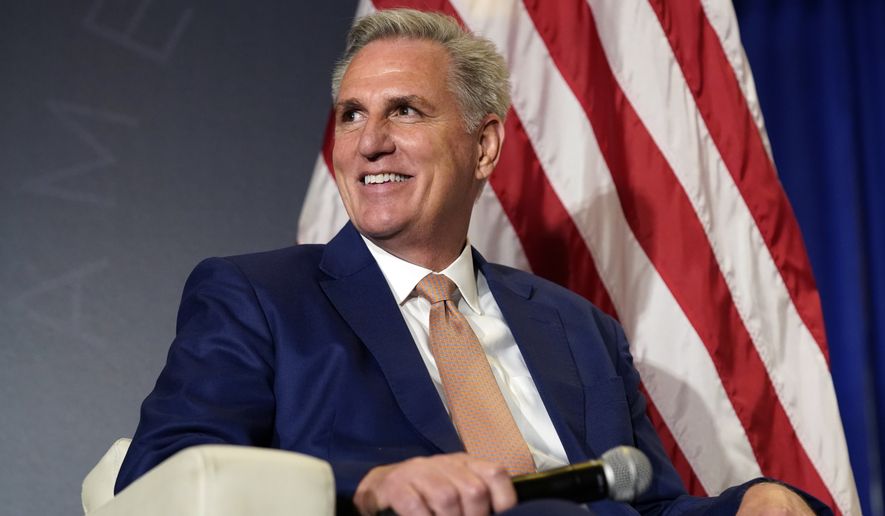House Republicans on Tuesday elected Rep. Kevin McCarthy as their nominee for speaker, voicing approval of his role in winning the majority even if it is a slim one.
Though Mr. McCarthy, 53, was supported by the majority of the conference, some Freedom Caucus members opposed him. He will have to shore up near unanimous support of House Republicans for the 218 votes necessary to win the speaker’s gavel when the full chamber votes on it on Jan 3.
In the closed-door vote, he easily defeated a challenge from Freedom Caucus member Rep. Andy Biggs of Arizona, 188 to 31.
Rep. Steve Scalise of Louisiana, who served as the conference’s No. 2 leader under Mr. McCarthy in the minority, was voted in for the same post as majority leader. He said he was confident the conference will unite to make Mr. McCarthy speaker in January.
Flanked by his new leadership team, Mr. McCarthy told reporters that recent history shows he would likely attain at least 218 votes on the House floor in January.
“If you look at the last two speakers, Paul Ryan, he had at this time 43. He lost 43 votes. Nancy Pelosi had 32 votes, and no one was running against her at that time,” he said. “Look, we have our work cut out for us. We’ve got to have a small majority, and we’ve got to listen to everybody in our conference.”
Rep. Mike Kelly of Pennsylvania, who voted for Mr. McCarthy, lamented the infighting by saying Republicans “always like to fight in the front yard.”
SEE ALSO: Dems’ control of Senate greenlights Biden judicial nominees
“Nothing more harmful to Republicans than to be in a primary with another Republican,” he said.
Mr. McCarthy, California Republican, raised about $500 million for House Republican candidates this cycle, earning loyalty from many in the conference.
The vote split the Freedom Caucus. Some members were outspoken about their intention to vote against Mr. McCarthy, including Rep. Matt Gaetz of Florida and Rep. Chip Roy of Texas. Other members of the conservative group, such as Rep. Marjorie Taylor Greene of Georgia and Rep. Jim Jordan of Ohio, planned to support the California Republican.
Mr. McCarthy’s opponents argued that he was not conservative enough and did not do enough over the past two years to challenge House Speaker Nancy Pelosi and her Democratic majority.
Freedom Caucus members in September sent Mr. McCarthy a letter that included several demands, including restoring a rule to allow any member to request a vote to oust the speaker. They also want to eliminate the automatic suspension of the debt ceiling without a standalone vote when the House adopts a budget resolution.
They also want to prohibit combining spending bills into massive, omnibus packages at the end of the year that usually passes with little scrutiny or debate.
SEE ALSO: Manchin quickly becomes Republicans’ next target with first 2024 challenge
Mr. McCarthy bristled at the idea of reviving the motion to vacate the chair, telling reporters, “when the conference is this tight? I think we all work together at the same time, nobody’s going to have more power than anybody else.”
He did dispute a charge made by Rep. Bob Good, Virginia Republican, that he did not respond to the Freedom Caucus letter of demands for the new Rules Package.
“They provided a letter and the different rules … Now I’ve met with them numerous times, we actually changed the process where last night, we just had a conference just to talk about it,” he said.
Mr. McCarthy noted the GOP conference will bring up half of the Freedom Caucus’ demands and talk about them Wednesday.
“I can’t do anything by myself. It’s the conference who decides what the conference rules are,” he said.
“No longer is all the power going to rest the way Nancy [Pelosi] had it. No more proxy voting,” he said, referencing the remote voting House Speaker Nancy Pelosi established at the beginning of the pandemic.
“Bills will actually go through committees. They will be debated before they come to the floor and people will actually have a say.”
Rep. Tom Emmer of Minnesota won the three-way contest for the whip job, which is the vote counter and enforcer for the conference leaders. He was up against Rep. Jim Banks of Indiana and Rep. Drew Ferguson of Georgia.
Mr. Emmer, who served as chair of the National Republican Congressional Committee was considered a hero to his fellow GOP lawmakers following the 2020 presidential election when they picked up about 15 seats, leaving House Speaker Nancy Pelosi with a very slim majority.
The Republican majority next year could be slimmer.
Mr. Emmer found himself on the defensive this cycle after the less-than-stellar results. He told reporters that Republicans should still be happy because they are about to win the lower chamber’s majority, whatever the margin.
• Kerry Picket can be reached at kpicket@washingtontimes.com.




Please read our comment policy before commenting.